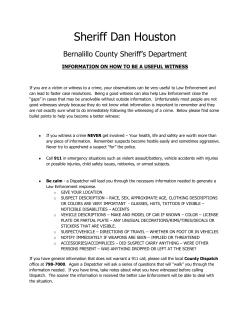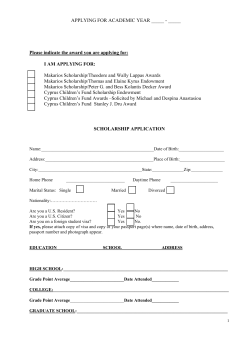
Fundamentals of Trial Practice Series Depositions: Tips and Strategy for Antitrust Litigators
Trial Practice Committee Fundamentals of Trial Practice Series Depositions: Tips and Strategy for Antitrust Litigators June 25, 2014 12:00 to 1:00 pm Eastern 46556089 Moderator: • Layne Kruse, Norton Rose Fulbright Panel: • David Martinez, Robins Kaplan • Robby Robertson, Hogan Lovells • Judith Zahid, Zelle Hofmann 2 Moderator Layne Kruse, Norton Rose Fulbright 3 Panel Member David Martinez, Robins, Kaplan, Miller & Ciresi L.L.P. 4 Panel Member J. Robert Robertson, Hogan Lovells 5 Panel Member Judith A. Zahid, Zelle Hofmann Voelbel & Mason LLP 6 Topics • • • • • Witness preparation. Foreign language problems Effective presentations at trial Use of party depositions at trial Special problems for Rule 30(b)(6) depositions • Ethical issues on witness preparation 7 Key Elements of Rule 30(b)(6) • The deposition notice may “name as the deponent [an organization] and must describe with reasonable particularity the matters on which examination is requested.” • The named organization “must then designate one or more officers, directors, or managing agents, or designate other persons who consent to testify on its behalf.” • “The persons so designated must testify about information known or reasonably available to the organization.” 8 A Company Has Latitude in Designating its 30(b)(6) Representative(s) • The designated witness is not required to have personal knowledge of the topic. – The subject matter of the testimony is the knowledge of the corporation, not of the individual. – The 30(b)(6) witness is free to testify at the deposition on matters outside his personal knowledge if they are within the knowledge of the corporation. – More than one witness may be needed in response to the Notice. 9 Questioning A Witness About Matters Outside the 30(b)(6) Notice Can a party issue a Notice that describes the topics of the deposition and then question the witness about matters outside the Notice? 10 Paparelli v. Prudential Ins., 108 F.R.D. 727, 731 (D.Mass. 1985)(minority view). “None of the reasons given by counsel for the defendant Westinghouse for instructing the witness not to answer fall within the category where an answer would cause some serious harm, i.e. the answer would reveal trade secrets, privileged material, or other confidential material. . . . Accordingly, the instructions not to answer were improper and a violation of Rule 30(c) ...” 11 King v. Pratt & Whitney, 161 F.R.D. 475 (S.D. Fla. 1995). • “The answer is not clearly found on the face of the Rules.” • “Rule 30(b)(6) leaves this issue open to question.” • “However, this Court believes that there is a better reading of the Rule and declines to follow Paparelli.” 161 F.R.D. at 476 (emphasis added) 12 King Court: Examining Party Should Not Have to Re-Notice Witness “Rule 30(b)(6) should not be read to confer some special privilege on a corporate deponent responding to this type of notice. Clearly, Plaintiff could simply re-notice a deponent under the regular notice provisions and ask him the same questions that were objected to. However, Plaintiff should not be forced to jump through that extra hoop absent some compelling reason.” 161 F.R.D. at 476 (emphasis added) 13 Rule 30(b)(6) In Antitrust Cases: Prior Government Investigations In re Vitamins Antitrust Litigation, 216 F.R.D. 168 (D.D.C. 2003) (M.D.L. 1285) (sanctions for failure to produce educated witness to testify; should have been prepared on EC and Canadian issues). In re Linerboard Antitrust Litigation, 237 F.R.D. 373 (E.D. Pa. 2006) (M.D.L. 1261) (notice improperly sought facts underlying corporate counsel assertions in document produced to FTC; counsel’s recollection of internal investigation interviews was work product). 14 Rule 30(b)(6) In Antitrust Cases: Prior Government Investigation In re Neurontion Antitrust Litigation, 2011 W.L. 253434 (D.N.J. 2011) (M.D.L. 1479) (Defendant should have prepared witness to provide facts about denials in answer compared to prior criminal plea). 15 What are the ethical considerations of witness preparation? “An attorney must respect the important ethical distinction between discussing testimony and seeking improperly to influence it." Geders v. United States, 425 U.S. 80, 90 n.3 (1976); Hall v. Clifton Precision, 150 F.R.D. 525, 528 (E.D. Pa. 1993). 16 Permissible witness preparation activities (Restatement, The Law Governing Lawyers §§116) 1. Discussing applicability law to the events in issue and the necessary proof, as well as legal consequence 2. Reviewing factual context into which the witness’s observations or opinions will fit; 3. Inviting witness to provide truthful testimony favorable to the lawyer’s client; 4. Suggesting choice of words that might be employed to make the witness’s meaning clear. 5. Discussing the role of the witness and effective courtroom demeanor; 17 6. Discussing the witness’s recollection and probable testimony; 7. Revealing to the witness other testimony or evidence that will be presented and asking the witness to reconsider the witness’s recollection or recounting of events in that light; 8. Reviewing documents or other physical evidence that may be introduced; and 9. Discussing probable lines of hostile crossexamination that the witness should be prepared to meet. 18 Prohibited Activities Model Rules of Professional Conduct, Rules 1, 3 and 8 1. Counsel or assist a client in conduct that the lawyer knows is criminal or fraudulent (Rule 1.2(d)); 2. Counsel or assist a witness to testify falsely, or offer evidence that the lawyer knows to be false (Rule 3.3(a)(4)); 3. Engage in conduct involving dishonesty, fraud, deceit, or misrepresentation (Rule 8.4(c)); or 4. Engage in conduct prejudicial to the administration of justice (Rule 8.4(d)). 5. Obstruct another party’s access to a witness. 6. Induce or assist a prospective witness to evade or ignore process obliging the witness to appear to testify. 19 Closing 20
© Copyright 2025





















